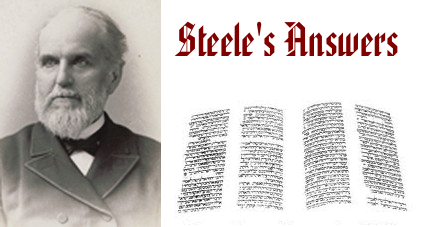QUESTION: A holiness evangelist who has been very useful in the past tries to prove that the Apostles were cleansed before Pentecost, and ridicules the idea of the Spirit's agency in applying the blood of Christ to cleanse the following dilemmas:
(1) It makes the penitent sinner accept the Son of God to save him from the guilt and death of sins that are past, and it requires that the regenerate believer shall accept the Holy Spirit to save him from the pollution and inbeing of sin in the flesh. ANSWER: In the interest of clearness of thought we say that salvation requires (1) a work done for us, pardon: and (2) a work done in us, purification. The atonement makes it safe for God to offer pardon to all penitent believers, and it also procures the Holy Spirit to purify initially in the new birth, and to purify wholly through the Holy Spirit, whose agency is appropriated by faith. Here is no dilemma. Both works depend on the blood of Christ, the first directly and the second indirectly.
(2) If the Holy Spirit is the agency in applying the blood for the entire sanctification of the believer, why not the same method for the sinner? ANSWER: The Holy Spirit does not pardon. This is an act instantaneous in the mind of God. But purification is a process wrought in us, having a beginning and an end, the interval between them being determined by our faith, which depends on our sense of need. The new-born soul does not at first feel the need of entire sanctification, in the joy of sins forgiven; but it soon finds that there are wrong tendencies remaining which must be eradicated. This is the reason why the internal work of the Spirit, beyond the imparting of spiritual life, is not a single act coincident with regeneration and justification, but, a process having a notable end this side of death, though not, far this side in the case of those who are slow to believe.
(3) The advocates for the Pentecostal cleansing theory have but one text to support their theory, and to found a theory or doctrine upon a single text violates the rules of true interpretation by the rule of faith.ANSWER: This is neither a theory nor a doctrine, but a historical fact proved by one witness, especially, if his testimony has many incidental confirmations, such as the changed conduct of the apostles, no more questioning who is the greatest, self-crucifixion, perfect love to one another, all things common, perfect obedience, zeal, boldness,etc., after Pentecost.
(4) The Pentecostal cleansing theory is supported ONLY by a single text and that one wrongly interpreted (Acts 15:9). The word for cleansing is an Aorist Participle (he says), and denotes completed action at a past time. (a) (And he here quotes several Greek grammarians in proof), and being an act in past time refers to initial believing or conversion. (a) Sometimes it does, and sometimes it "is joined with a verb of past time, to denote (1) that by which the action of the verb is performed, or (2) that in which it consists; here it does not denote time past with reference to the leading verb, but rather coincides with it in time." (Goodwin's Gk. Moods and Tenses, page 49.)ANSWER: Apply this to Acts 15:8,9 and note how beautifully our paraphrase brings out Peter's meaning, "And God, who knoweth the heart, bare them (Gentiles) witness by giving (Aorist Participle) them (Gentiles) witness by giving (Aorist Participle) them the Holy Spirit, even as he did unto us; and he made no distinction (Aorist) between us and them (Gentiles) in cleansing (Aorist) their hearts by faith — "not by death," adds J. Fletcher. Note the fact that the two Greek Aorist participles "do not" as Professor Goodwin says, "denote time past with reference to 'made,' the leading verb, but rather coincide with it in time." The first, "giving" denotes the means "by which the second, "purifying" denotes that "in which" the leading verb "made" consists.
(5) He makes this Aorist Participle and pronoun "their" refer back through fourteen chapters of the Apostles, and many other chapters in the Gospels, and makes them travel over a retrospective roadway of seventeen years of time for their objects and antecedents to the time and act of their conversion. Has he the right view? ANSWER: "Their" refers to "them" the Gentiles. This is as plain as the nose on a man's face. These Gentiles received either initial or perfect cleansing, according to their individual faith. Cornelius and his house were pious Monotheists in acceptance with God, some not so far advanced were probably feeling after pardon and the new birth. To these the Spirit brought regeneration which is sanctification begun and the witness to adoption, but to those who already had spiritual life there came the fullness of the Spirit sanctifying wholly. The same phenomena were seen as at Pentecost; sinners were convicted, penitents were regenerated, and believers were made perfect in love through the power of the sanctifier
.
— Steele's Answers pp. 221-225.

